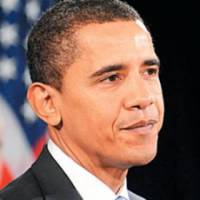Obama Comments on Dismissed Terror Attempt
After a Nigerian linked to radicals in Yemen allegedly tried to blow up a plane, President Barack Obama said human and systemic failures created a "potential catastrophic breach of security."

The information gathered by the intelligence community on Umar Farouk Abdulmutallab, including warnings to U.S. officials from his father, should have been enough to get him on a no-fly list, Obama said.
Two U.S. officials said that the intelligence-sharing lapse involved a report that the CIA prepared, based on information from the father, that was not shared with the broader intelligence or homeland security community for follow-up.
"When our government has information on known extremists and that information is not shared and acted upon ... so this extremist boards a plane with dangerous explosives that could have cost nearly 300 lives, a systemic failure has occurred, and I find that totally unacceptable," he said, Detroit Free Press reports.
It was also reported, t he comments by the president and the senior administration official, who spoke on condition of anonymity because of the sensitivity of the matter, suggested that the lack of information-sharing that plagued the U.S. intelligence community before the Sept. 11, 2001, terrorist attacks still persists.
"It is now clear to us that there are bits and pieces of information that were in the possession of the U.S. government in advance . . . that, had they been assessed and correlated, could have led to a much broader picture and allowed us to disrupt the attack," the official said. "Or certainly to know much more about the alleged attacker in such a way as to ensure that he was on . . . a no-fly list."
The information, the official said, "was in some instances about the individual in question and his plans, some of it was about Al Qaeda and its plans, some of it was about potential attacks during the holiday , " The Los Angeles Times reports.
In the United States, FBI agents conducted fresh interviews of each passenger on the Amsterdam-to-Detroit flight and focused on Abdulmutallab's past six months, when investigators suspect that he grew increasingly radicalized, according to two federal officials who spoke on the condition of anonymity so as not to interfere with the investigation.
Intelligence officials said they are eager to close whatever gaps the Abdulmutallab case may have exposed. But several took issue with Obama's reference to "bits of information available within the intelligence community," saying that what might appear clear in retrospect was far from conclusive at the time.
"Abdulmutallab's father didn't say his son was a terrorist" when he visited the U.S. Embassy, "let alone [that he was] planning an attack. Not at all," one U.S. intelligence official said. "I'm not aware of some magic piece of intelligence that suddenly would have flagged this guy -- whose name nobody even had until November -- as a killer en route to America, let alone something that anybody withheld," The Washington Post reports.
Subscribe to Pravda.Ru Telegram channel, Facebook, RSS!





